Perhaps sensing electoral doom and looking for a Hail Mary, President Trump recently tweeted that U.S. troops in Afghanistan should be home by Christmas. This radical departure in U.S. plans came a day after his national security advisor, Robert O’Brien, had announced that American forces in Afghanistan would decline to some 2,500 by early 2021. That was already a big additional cut, as it would halve the previously decided number and represent a more than 97% reduction from the peak U.S. strength of the early Obama years.
Now we are supposedly aiming for zero before the end of this year. It is not yet clear if Trump’s tweet amounts to a hope, a plan, or an order — but as commander in chief, he might well have the power to insist on execution of such a decision unilaterally, even if Congress tried to override his decision.
Predictably, the first to congratulate Trump on his tweet were Taliban leaders, who were already interpreting the February 29 accord they signed earlier this year with Trump to require a complete U.S. departure by May 2021. If he is willing to move up the date by five months, and make sure that a President Biden could not revisit that idea, all the better, they likely reckoned. Never mind that the Taliban, according to the U.N., retain ties with al-Qaida elements like the Haqqani network that technically put them in noncompliance with the February 29 accord themselves. Never mind that violence in Afghanistan, initiated by the Taliban, remains undiminished, violating the spirit if not the letter of that same agreement.
If Trump carries through on his new pledge to remove all U.S. forces from Afghanistan in less than 80 days, the following developments are either inevitable or likely to occur — based on what we know about American military logistics, the dynamics of the Afghanistan war, and historical precedents in places like Vietnam in the early 1970s and Afghanistan itself when the Soviets pulled out in 1989.
- Other members of the international military coalition still supporting the Afghan government in its ongoing fight against the Taliban will surely leave too, on a similar schedule. They depend too much on the United States for logistics, intelligence, and military backstop to be able to sustain the mission without us.
- Because it is doubtful that everything could be dismantled and flown out of the country in the 11 weeks that remain before Christmas, a good deal of American military equipment would need to be destroyed on site, lest it someday fall into Taliban hands.
- The Taliban, already convinced that the elected and constitutionally-based government of President Ashraf Ghani is a mere puppet of the world community, will double down on their hardline approach in the peace talks that recently began in Doha. Believing that Ghani’s days are numbered, they will surely demand the lion’s share of all power for themselves, including predominant control of the country’s security forces, schools, and courts.
Soon after the departure of NATO coalition partners, we would have to expect a multi-pronged Taliban attack similar to the Viet Cong’s Tet offensive in Vietnam in 1968, designed to intimidate the ruling Afghan classes into flight or capitulation, and the security forces into dissolution.
Thus, the United States and other foreign countries will either have to close their embassies by Christmas, given the likelihood of such a massive Taliban offensive, or keep dozens of helicopters on ships in the northern Arabian Sea awaiting the potential need for a Saigon-like extraction of key personnel at any time.
More likely, the war would go on for a while, even if Kabul and other cities were no longer remotely safe for anyone. The Taliban has been gradually gaining the upper hand in the war over the past decade or so, but only slowly — with U.S. intelligence estimating that it typically gains control of about an additional 1% of the country’s territory and population per year. But all the cities remain now in government hands, as do most of the nation’s 400+ districts. So even if the Taliban’s military prospects improved appreciably, they might not be able to seize and hold the country anytime soon. It is at least as likely that NATO’s departure would condemn the country to a worsening civil war as it would produce a quick Taliban takeover.
Over time, however, the odds would indeed be with the Taliban. For one thing, Pakistan’s newfound interest in apparently helping to mediate a power-sharing deal would probably be dropped in favor of Islamabad helping the Taliban control the country, so that an India-friendly group could not.
Another possible outcome of the war is partition of the country, Bosnia-style. Since the Taliban is made up more or less exclusively of members of the Pashtun ethnic group (who represent about 40% to 45% of the nation’s population), one could easily imagine that a civil war would produce massive ethnic cleansing in the north and center of the country, as Tajiks and Uzbeks drove Pashtun populations from northern cities so that they could effectively close off much of the country from enemy infiltration. The massive ethnic cleansing that could ensue might displace up to several million, with hundreds of thousands dead, before the partition became semi-stable.
Perhaps a future Taliban government would be willing to temper its ties to extremist groups like al-Qaida in an effort to gain Western aid. But in anything resembling the above scenarios, it is difficult to believe such aid would be forthcoming for long. So Taliban leaders would likely have little incentive to moderate. More likely, they would again grant sanctuary to extremist groups, some of which might have terrorist designs on the West (or a desire to foment Indo-Pakistan war, as Lashkar-e-Taiba attempted in the Mumbai attack of 2008).
The NATO alliance will have failed in its largest and longest wartime operation to date — with Trump unilaterally taking an action that would discard and dishonor the sacrifices of many other countries over the years (including more than 1,000 troop fatalities since 2001).
Really, Mr. President? This is what you want? Would it not be better to remind the American voter, as you previously had accurately done, that the U.S. military presence of 2020 in Afghanistan would be less than what you inherited from President Obama, with the possibility that peace talks could eventually bring it down much further? That seems a smarter plank in an electoral platform — and one that does not smack of desperation, either.
The Brookings Institution is committed to quality, independence, and impact.
We are supported by a diverse array of funders. In line with our values and policies, each Brookings publication represents the sole views of its author(s).
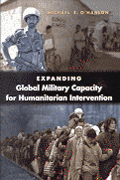

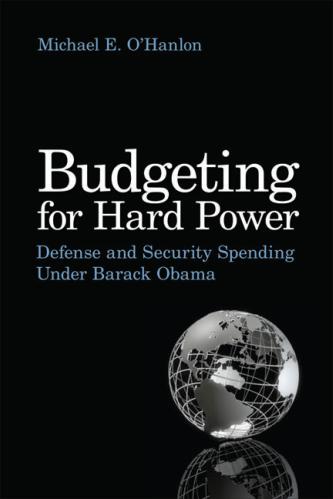
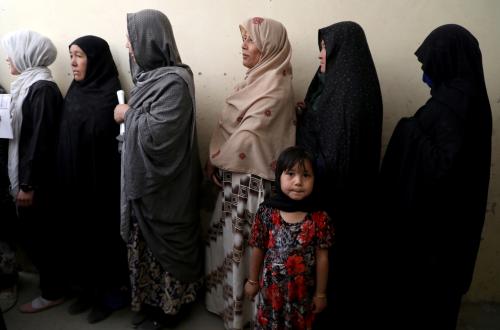
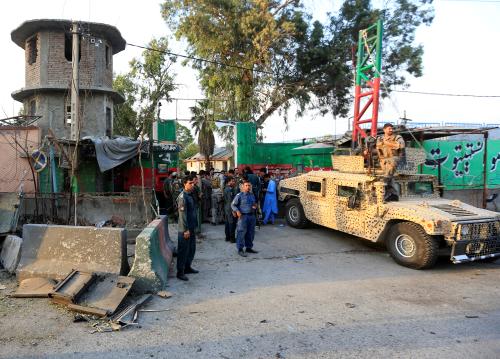
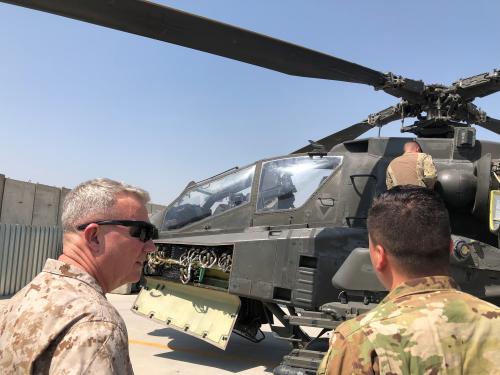

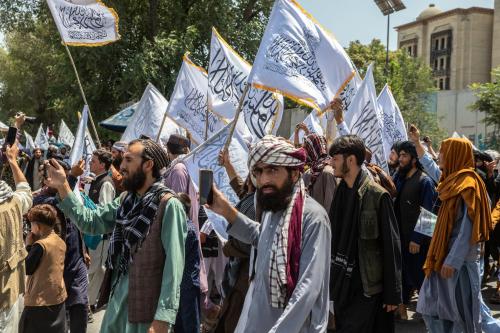

Commentary
Trump wants the troops home from Afghanistan by Christmas
Will the helos be flying off the embassy roof soon after?
October 9, 2020